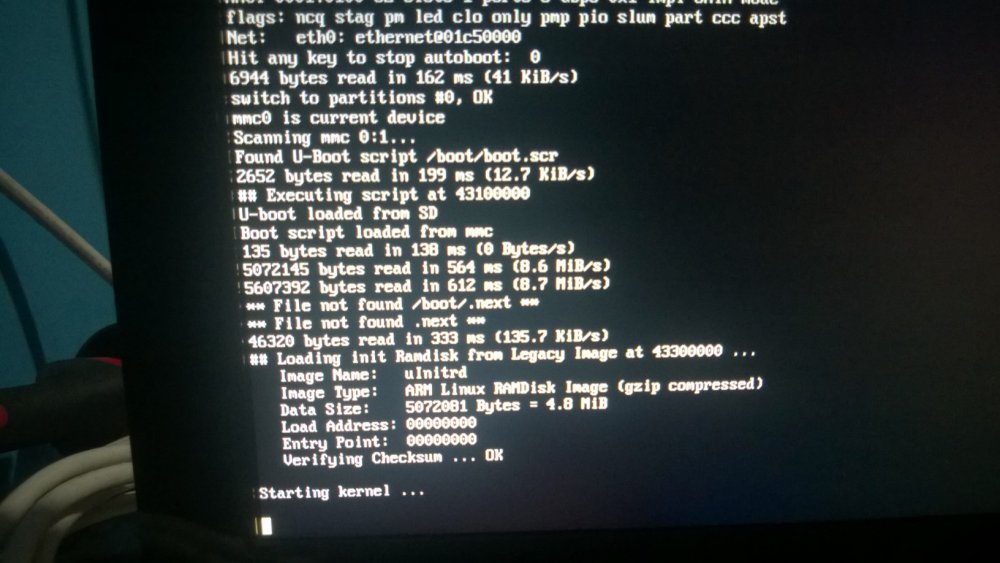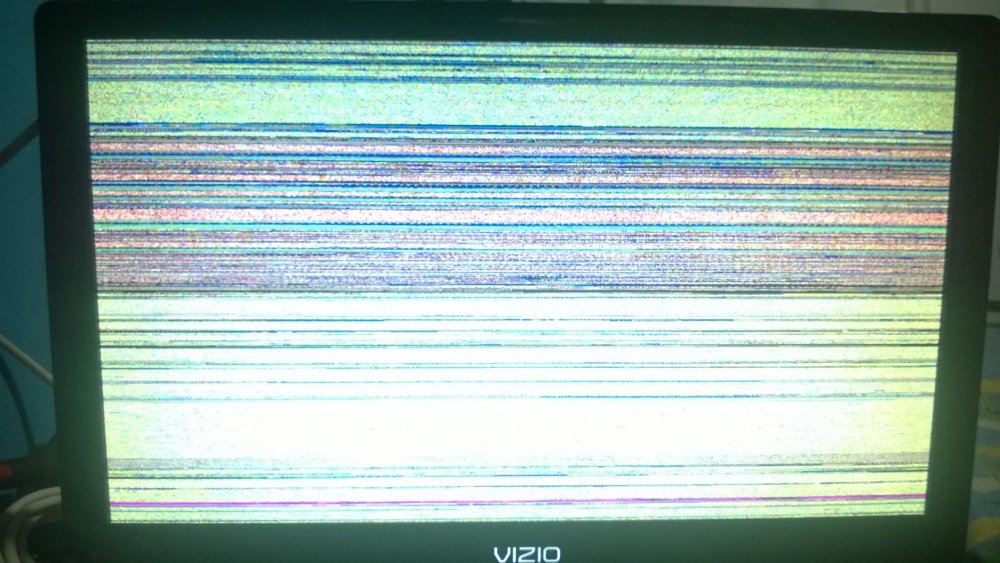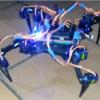Search the Community
Showing results for tags 'cubieboard2'.
-
Hi, I'm trying to run a DHT22 Temperature & Humidity sensor on my Cubieboard2 but I seem to fail at the beginning on how to use the GPIO Pins correctly What I have: Cubieboard2 Armbian Linux version 4.11.6-sunxi (root@devel) (gcc version 7.1.1 20170510 (Linaro GCC 7.1-2017.05) DHT22 (worked on a Raspberry Pi3 before) What I've done so far: According to this Overview (http://docs.cubieboard.org/cubieboard1_and_cubieboard2_gpio_pin) I connected the sensor on 3v3, GND and on PD25 (LCDDE). As far as I understood the LCD pins can be also used for other things. Followed "Accessing the GPIO pins through sysfs with mainline kernel" (http://linux-sunxi.org/GPIO) => (position of letter in alphabet - 1) * 32 + pin number (4 - 1)*32 + 25 = 121 The example says I have to add again +25 to the example "E.g for PH18 this would be ( 8 - 1) * 32 + 18 = 224 + 18 = 242 (since 'h' is the 8th letter)." => So 121+25 = 146 should be my correct value Since it's a sensor I guess I've to use "in" as direction. root@cubieboard2:/sys/class/gpio# echo 146 > /sys/class/gpio/export root@cubieboard2:/sys/class/gpio# echo "in" > /sys/class/gpio/gpio146/direction bash: echo: write error: Unknown error 517 Tried it also with the 121 value as the formula mentioned it (no error), expected here another value than 1 root@cubieboard2:/sys/class/gpio# echo 121 > /sys/class/gpio/export root@cubieboard2:/sys/class/gpio# echo "in" > /sys/class/gpio/gpio121/direction root@cubieboard2:/sys/class/gpio# cat /sys/class/gpio/gpio121/value 1 Besides this I've seen that there are a lot of posts about attach DHT22 to Orange Pi or to BananaPi. Tried some of those but I'm completly lost to adapt those instructions with 1-wire or wiringpi to the cubieboard2. I know that on Raspberri Pi it's necessary to load the library for the Adafruit modules which where supported for BeagleBone black & RasPi. Does someone have some clues how to get this working or tried this by himself? Thanks in advance.
-
Hello! The Cubieboard2 with mainline kernel support LCD through DVK522 board (LVDS connection)? The mainkernel support SPI?
-
Hi. Is there any way to download armbian mainline kernel 4.11.6 source? (I want to compile small kernel module) There is only 4.9 source package available...
-
Hi I need to execute some command when system is going down for halt/poweroff. I need to know this inside my script /etc/init.d/myScript which is called when system is going down. I used to do it by checking $runlevel variable and if it is set to 0, then system was going down for halt, it was working for instance in Raspbian a few years ago. However, in my Linux cubieboard2 4.9.12-sunxi Armbian this variable is not set, and when I execute "runlevel" command inside "STOP" case in myScript it says it is in N 5 runlevel which is not true because I have executed poweroff All tips are welcome Best Regards Marek
-
Hello, I have a cubieboard 2 (the one with only one SD slot) and there is a version of Linaro that is bootable in the NAND memory. I created a card with Debian Jessie Server (the last one) and boot it successfully, but when I run nand-sata-install I get a "No targets available. Please check your drives" pop up. I tried downloading the Debian Wheezy and creating a card and on that one I can see the nand memory blocks, but don't have the script to install and the one that came by default only installs to SATA (not to NAND). Anything I may be doing wrong here??
-
Hello! I'm running CB2 board as home server for a long time and after recent upgrade I've got an issue with LXC container. LXC container has "Ubuntu" inside and provides TOR functionalty + access point via connected USB wifi. USB adapter passed to container like this: lxc-wait -n tor -s RUNNING lxc-device -n tor add wlan0 I'm not using it recently, but recently I found, that after connection to AP nothing happens (no internet, DNS servers are IPV6 :)) and host system (CB2) is completely frozen. After reboot I've connected via SSH and retried to connect to access point - again freeze, and screen is populated with this: I'm pretty sure, that it stared with one of recent upgrades. Unfortunately I utilize "torred access point" not really often, so cannot tell, which upgrade exactly caused this. It worked like charm in April :). Since such setup (with LXC + bypassing network interface) is not really common, I understand, that it may not be not fixed in visible period of time :(. So 2 questions : 1) Did anyone encountered something similar or just something LXC-related with recent kernel and any chances to fix this ? 2) How I can downgrade kernel to previous version (looks like after this I can freeze kernel update via this new utility) ? Where packages are located and what is correct procedure ? (Sorry if it was already asked). P.S. dmesg attached just in case. dmesg4.11
-
Hello Armbian community. Recently, I decided do try new distros for the Cubieboard 2. and Armbian seemed to be a really good option. However, just booting the latest image started to cause problems. After writing the image with the proper software on a proper SD card as mentioned by this webpage, it just doesn't work at all. To be brief, I took pictures of what appears on the screen, first being what seems like to be an error displayed by text, then a really messed up screen, and finally the board shutting down by itself. I would appreciate any help or recommendations regarding this issue.
-
Dear.I run for years on my cb2 a home automation system..Only now i need some more power. [ my cpu is running to his max ]Can i speed up the cpu of the CB2?I hope that there ia someone that can help me to let live my cb2 longer..Thanks..
-
Hi My cubie2 with a 2.5" HDD has exception Emask 0x10 SAct 0x80000 SErr 0x90300 action 0xe frozen [182296.803589] ata1.00: irq_stat 0x08400000, interface fatal error, PHY RDY changed [182296.803605] ata1: SError: { UnrecovData Persist PHYRdyChg 10B8B } [182296.803624] ata1.00: failed command: READ FPDMA QUEUED errors sometimes, which causes shutdown, spin up for HDD, with a big click sound, and it's not good for it. So i would try if it happens when the sata link is set to slower. But how can i do that?
-
Hi. I would like to install Armbian on Cubieboard2 with eMMC as internal storage and have faced some problems. The first challenge was to make eMMC accessible, it was solved using .fex from cubieboard sdk for this revision (also tried cubieboard2dual.fex, but without any effect). The second problem was behavior of nand-sata-install included in desktop image - it overwrite wrong root partition (external SD instead of eMMC), but it was also solved using latest version of nand-sata-install. But after installation, system isn't booting from eMMC. Since root filesystem is successfully copied to eMMC, I think there is problem with bootloader. Is there any way to solve this problem?
-
I've download Armbian_5.25_Cubieboard2_Ubuntu_xenial_default_3.4.113_desktop (Ubuntu desktop – legacy kernel ) and copie with dd on a 32GB EVOSamsung sd-card. After boot until loading Kernel , the Loading crashd and the board goes off. What can i do? best regards mtpmoni
-
i use armbian on my cubieboard2(based on Allwinner A20 Chip) with default HDMI. i have some problems. the first is default font of Terminal emulator and XTERM is so small. how can i changed their font size ?????!!! the second is i cant edit/create network connection with network manager. the ipv4 nad . .. are disable. is there anyone to help me plz.????
-
Is the Cubieboard 2 a true Mac Address or is random generated or fixed in firmware ? Thank you very much.
-
Hi, admin. I installed Mainline 4.9.12-sunxi on my cubieboard 2. Since the Mainline kernel doesn't have Mail driver and hardware accelerated video decoding, I want to downgrade the kernel to Legacy 3.4.113. If I don't want to reinstall the whole system, is there anyway to replace the kernel with the old version? Many thks!
-
Hi List, I have a cb2 with armbian kernel 4.9.12. I need to change some things in the kernel to use ptp. However I seem not to be able to download the kernel sources> sudo apt-get source linux-image-next-sunxi gives me the E: Unable to find a source package for linux-4.9.12-sunxi Error. I checked the directions for /etc/apt/sources.list.d/armbian.list but that was already in place Am I missing something?? Tx for any pointers! Jer
-
Hi Do You know if there are any problems with deploying armbian on cubieboard 2 with TSD instead of NAND ? Do I have to change anything on the system side or is it transparent ? Adam
-
Hi, When Armbian starts loading kernel (just after showing loading kernel), the screen just gets scattered and Cubieboard2 shuts down. The Mainline on the other hand boots without a problem. Can I do something to get more info about what causes the problem, as I would like to be able to run the Legacy 3.4.113 version. The scatter is similar to this image: Thanks!
-
Hi all. I've got an issue trying to use Bluetooth and RFCOMM. My system is: Cubieboard2 running latest img and updated with apt-get update/upgrade: ____ _ _ _ _ ____ / ___| _| |__ (_) ___| |__ ___ __ _ _ __ __| | |___ \ | | | | | | '_ \| |/ _ \ '_ \ / _ \ / _` | '__/ _` | __) | | |__| |_| | |_) | | __/ |_) | (_) | (_| | | | (_| | / __/ \____\__,_|_.__/|_|\___|_.__/ \___/ \__,_|_| \__,_| |_____| Welcome to ARMBIAN 5.25 stable Debian GNU/Linux 8 (jessie) 4.9.12-sunxi System load: 0.07 Up time: 30 min Memory usage: 7 % of 1001Mb IP: 192.168.1.108 CPU temp: 33°C Usage of /: 34% of 7.2G Last login: Sun Mar 12 15:08:57 2017 from 192.168.1.103 root@cubieboard2:~# uname -a Linux cubieboard2 4.9.12-sunxi #4 SMP Thu Feb 23 19:46:51 CET 2017 armv7l GNU/Linux When I plug the Bluetooth USB dongle I get following dmesg: root@cubieboard2:~# dmesg -c [ 102.456773] usb 4-1: new full-speed USB device number 2 using ohci-platform [ 102.726860] usb 4-1: New USB device found, idVendor=1131, idProduct=1004 [ 102.726883] usb 4-1: New USB device strings: Mfr=1, Product=2, SerialNumber=0 [ 102.726893] usb 4-1: Product: ISSCEDRBTA [ 102.726903] usb 4-1: Manufacturer: ISSC [ 102.809982] Bluetooth: Core ver 2.22 [ 102.810123] NET: Registered protocol family 31 [ 102.810130] Bluetooth: HCI device and connection manager initialized [ 102.810158] Bluetooth: HCI socket layer initialized [ 102.810175] Bluetooth: L2CAP socket layer initialized [ 102.810269] Bluetooth: SCO socket layer initialized [ 102.852031] usbcore: registered new interface driver btusb [ 103.285771] Bluetooth: BNEP (Ethernet Emulation) ver 1.3 [ 103.285785] Bluetooth: BNEP filters: protocol multicast [ 103.285806] Bluetooth: BNEP socket layer initialized root@cubieboard2:~# lsmod Module Size Used by bnep 8221 2 btusb 21996 0 btrtl 3731 1 btusb btbcm 4867 1 btusb btintel 5439 1 btusb bluetooth 247916 24 btrtl,btintel,bnep,btbcm,btusb cfg80211 337391 0 rfkill 8383 3 bluetooth,cfg80211 sun4i_codec 10104 3 evdev 9412 1 snd_soc_core 97876 1 sun4i_codec snd_pcm_dmaengine 2770 1 snd_soc_core snd_pcm 57757 2 snd_pcm_dmaengine,snd_soc_core nvmem_sunxi_sid 1967 0 ir_lirc_codec 4088 0 snd_timer 14809 1 snd_pcm nvmem_core 7158 1 nvmem_sunxi_sid lirc_dev 6245 1 ir_lirc_codec snd 35783 3 snd_timer,snd_soc_core,snd_pcm soundcore 858 1 snd sun4i_ts 3414 0 sunxi_cir 3159 0 sun4i_ss 13213 0 cpufreq_dt 2920 0 uio_pdrv_genirq 2780 0 uio 6272 1 uio_pdrv_genirq bonding 82855 0 fuse 62841 1 root@cubieboard2:~# hciconfig -a hci0: Type: BR/EDR Bus: USB BD Address: 00:15:83:E3:4B:90 ACL MTU: 510:8 SCO MTU: 48:10 UP RUNNING RX bytes:541 acl:0 sco:0 events:28 errors:0 TX bytes:1333 acl:0 sco:0 commands:28 errors:0 Features: 0xff 0xfe 0xff 0xfe 0x98 0x3f 0x79 0x83 Packet type: DM1 DM3 DM5 DH1 DH3 DH5 HV1 HV2 HV3 Link policy: RSWITCH HOLD SNIFF Link mode: SLAVE ACCEPT Name: 'cubieboard2' Class: 0x000000 Service Classes: Unspecified Device Class: Miscellaneous, HCI Version: 2.1 (0x4) Revision: 0x90e LMP Version: 2.1 (0x4) Subversion: 0x316 Manufacturer: Integrated System Solution Corp. (57) PS: how you can see with lsmod result the RFCOMM module isn't yet loaded. So BT dongle is working and I can find the desired a near powered HC - 05 Bluetooth Serial Module: root@cubieboard2:~# hcitool scan Scanning ... 30:14:12:26:06:04 IQ021-0006 root@cubieboard2:~# hcitool info 30:14:12:26:06:04 Requesting information ... BD Address: 30:14:12:26:06:04 Device Name: IQ021-0006 LMP Version: 2.1 (0x4) LMP Subversion: 0x1735 Manufacturer: Cambridge Silicon Radio (10) Features: 0xff 0xff 0x8f 0xfe 0x9b 0xff 0x59 0x83 <3-slot packets> <5-slot packets> <encryption> <slot offset> <timing accuracy> <role switch> <hold mode> <sniff mode> <park state> <RSSI> <channel quality> <SCO link> <HV2 packets> <HV3 packets> <u-law log> <A-law log> <CVSD> <paging scheme> <power control> <transparent SCO> <broadcast encrypt> <EDR ACL 2 Mbps> <EDR ACL 3 Mbps> <enhanced iscan> <interlaced iscan> <interlaced pscan> <inquiry with RSSI> <extended SCO> <EV4 packets> <EV5 packets> <AFH cap. slave> <AFH class. slave> <3-slot EDR ACL> <5-slot EDR ACL> <sniff subrating> <pause encryption> <AFH cap. master> <AFH class. master> <EDR eSCO 2 Mbps> <EDR eSCO 3 Mbps> <3-slot EDR eSCO> <extended inquiry> <simple pairing> <encapsulated PDU> <non-flush flag> <LSTO> <inquiry TX power> <extended features> HC-05 has a default PIN number of 1234 for authentication so I've added right info in pincodes file root@cubieboard2:/# echo "30:14:12:26:06:04 1234" >> /var/lib/bluetooth/00\:15\:83\:E3\:4B\:90/pincodes At this point I try to bind and connect HC-05 with RFCOMM module to get /dev/rfcomm0: root@cubieboard2:/# rfcomm -a root@cubieboard2:/# ls -p /dev/rfc* ls: cannot access /dev/rfc*: No such file or directory root@cubieboard2:/# rfcomm bind rfcomm0 30:14:12:26:06:04 1 root@cubieboard2:/# rfcomm -a rfcomm0: 30:14:12:26:06:04 channel 1 clean root@cubieboard2:/# ls -p /dev/rfc* /dev/rfcomm0 root@cubieboard2:/# lsmod Module Size Used by rfcomm 25714 1 bnep 8221 2 btusb 21996 0 btrtl 3731 1 btusb btbcm 4867 1 btusb btintel 5439 1 btusb bluetooth 247916 27 btrtl,btintel,bnep,btbcm,rfcomm,btusb cfg80211 337391 0 rfkill 8383 3 bluetooth,cfg80211 sun4i_codec 10104 3 evdev 9412 1 snd_soc_core 97876 1 sun4i_codec snd_pcm_dmaengine 2770 1 snd_soc_core snd_pcm 57757 2 snd_pcm_dmaengine,snd_soc_core nvmem_sunxi_sid 1967 0 ir_lirc_codec 4088 0 snd_timer 14809 1 snd_pcm nvmem_core 7158 1 nvmem_sunxi_sid lirc_dev 6245 1 ir_lirc_codec snd 35783 3 snd_timer,snd_soc_core,snd_pcm soundcore 858 1 snd sun4i_ts 3414 0 sunxi_cir 3159 0 sun4i_ss 13213 0 cpufreq_dt 2920 0 uio_pdrv_genirq 2780 0 uio 6272 1 uio_pdrv_genirq bonding 82855 0 fuse 62841 1 root@cubieboard2:/# dmesg -c [ 1088.424557] Bluetooth: RFCOMM TTY layer initialized [ 1088.424601] Bluetooth: RFCOMM socket layer initialized [ 1088.424637] Bluetooth: RFCOMM ver 1.11 /dev/rfcomm0 now exist and RFCOMM module is loaded by bluetooth module. At this point I try to send some chars to HC-05 using screen with #screen /dev/rfcomm0 but screen exit just after one second killing screen program. Same thing if I use picocom: root@cubieboard2:/# picocom -b 9600 /dev/rfcomm0 picocom v1.7 port is : /dev/rfcomm0 flowcontrol : none baudrate is : 9600 parity is : none databits are : 8 escape is : C-a local echo is : no noinit is : no noreset is : no nolock is : no send_cmd is : sz -vv receive_cmd is : rz -vv imap is : omap is : emap is : crcrlf,delbs, Terminal ready FATAL: term closed Some ideas ? Thank you very much in advance !!! Silverio Diquigiovanni
-
Only message I have received is: ----------------------------------------------------------- Case-1: Boot from SD Card"Cubian-nano+headless-x1-a20.img" Serial FTDI Output: U-Boot SPL 2014.01-rc1-09161-g108ec3f (Jan 20 2014 - 05:48:16) Board: Cubieboard2 ----------------------------------------------------------- Case-2 Without SD Card: Serial FTDI Output: HELLO! BOOT0 is starting! boot0 version : 3.0.0 dram size =1024 ----------------------------------------------------------- Where Cubie2board has android OS before the mess up. Can not figure out how this thing happen. Any Help would be a highly appreciated.
-
Hi, With current cubieboard2 image on SD class 10, local@solo:~$ time sudo dd if=/tmp/Armbian_5.25_Cubieboard2_Debian_jessie_next_4.9.7.img of=/dev/sdb bs=4k 326656+0 enregistrements lus 326656+0 enregistrements écrits 1337982976 octets (1,3 GB) copiés, 317,544 s, 4,2 MB/s not possible to boot on cubieboard2. Please find following log => => U-Boot SPL 2017.01-armbian (Feb 02 2017 - 02:16:44) DRAM: 1024 MiB CPU: 912000000Hz, AXI/AHB/APB: 3/2/2 Trying to boot from MMC1 U-Boot 2017.01-armbian (Feb 02 2017 - 02:16:44 +0100) Allwinner Technology CPU: Allwinner A20 (SUN7I) Model: Cubietech Cubieboard2 I2C: ready DRAM: 1 GiB MMC: SUNXI SD/MMC: 0 *** Warning - bad CRC, using default environment In: serial Out: serial Err: serial SCSI: SATA link 0 timeout. AHCI 0001.0100 32 slots 1 ports 3 Gbps 0x1 impl SATA mode flags: ncq stag pm led clo only pmp pio slum part ccc apst Net: eth0: ethernet@01c50000 Hit any key to stop autoboot: 0 6944 bytes read in 170 ms (39.1 KiB/s) scanning bus for devices... Found 0 device(s). Device 0: not available starting USB... USB0: USB EHCI 1.00 USB1: USB OHCI 1.0 USB2: USB EHCI 1.00 USB3: USB OHCI 1.0 scanning bus 0 for devices... 1 USB Device(s) found scanning bus 2 for devices... 2 USB Device(s) found USB device 0: unknown device ethernet@01c50000 Waiting for PHY auto negotiation to complete.. done Speed: 100, full duplex BOOTP broadcast 1 DHCP client bound to address 192.168.15.2 (4 ms) *** Warning: no boot file name; using 'C0A80F02.img' Using ethernet@01c50000 device TFTP from server 0.0.0.0; our IP address is 192.168.15.2 Filename 'C0A80F02.img'. Load address: 0x42000000 Loading: T T T T T T T T T T Retry count exceeded; starting again missing environment variable: pxeuuid missing environment variable: bootfile Retrieving file: pxelinux.cfg/01-02-c5-06-42-04-4b Speed: 100, full duplex *** ERROR: `serverip' not set missing environment variable: bootfile Retrieving file: pxelinux.cfg/C0A80F02 Speed: 100, full duplex *** ERROR: `serverip' not set missing environment variable: bootfile Retrieving file: pxelinux.cfg/C0A80F0 Speed: 100, full duplex *** ERROR: `serverip' not set missing environment variable: bootfile Retrieving file: pxelinux.cfg/C0A80F Speed: 100, full duplex *** ERROR: `serverip' not set missing environment variable: bootfile Retrieving file: pxelinux.cfg/C0A80 Speed: 100, full duplex *** ERROR: `serverip' not set missing environment variable: bootfile Retrieving file: pxelinux.cfg/C0A8 Speed: 100, full duplex *** ERROR: `serverip' not set missing environment variable: bootfile Retrieving file: pxelinux.cfg/C0A Speed: 100, full duplex *** ERROR: `serverip' not set missing environment variable: bootfile Retrieving file: pxelinux.cfg/C0 Speed: 100, full duplex *** ERROR: `serverip' not set missing environment variable: bootfile Retrieving file: pxelinux.cfg/C Speed: 100, full duplex *** ERROR: `serverip' not set missing environment variable: bootfile Retrieving file: pxelinux.cfg/default-arm-sunxi Speed: 100, full duplex *** ERROR: `serverip' not set missing environment variable: bootfile Retrieving file: pxelinux.cfg/default-arm Speed: 100, full duplex *** ERROR: `serverip' not set missing environment variable: bootfile Retrieving file: pxelinux.cfg/default Speed: 100, full duplex *** ERROR: `serverip' not set Config file not found Speed: 100, full duplex BOOTP broadcast 1 DHCP client bound to address 192.168.15.2 (3 ms) Using ethernet@01c50000 device TFTP from server 0.0.0.0; our IP address is 192.168.15.2 Filename 'boot.scr.uimg'. Load address: 0x43100000 Loading: * CTRL-A Z for help | 115200 8N1 | NOR | Minicom 2.7 | VT102 | Déconnecté | Thanks in advance for your help
-
Hi all, I'm trying to use a BENQ FP767 monitor with a Cubieboard2 using Legacy Server Jessie 5.25 image. The system is composed: Cubieboard -> HDMI to VGA converter -> Monitor. The bootloader works perfectly and I can see the boot phases in monitor which is synched to: 1280x1024 H.F : 79 KHz V.F : 75 KHz When Linux start the monitor frequencies change and chars are almost unreadable: 1280x1024 H.F : 67 KHz V.F : 59.7 KHz I've tried to change boot.cmd monitor settings from: ​ setenv disp_mode "1920x1080p60" to ​ setenv disp_mode "1024x1080p75" end compile changes with # mkimage -C none -A arm -T script -d /boot/boot.cmd /boot/boot.scr root@cubieboard2:/boot# mkimage -C none -A arm -T script -d /boot/boot.cmd /boot/boot.scr Image Name: Created: Fri Feb 17 08:59:38 2017 Image Type: ARM Linux Script (uncompressed) Data Size: 2615 Bytes = 2.55 kB = 0.00 MB Load Address: 00000000 Entry Point: 00000000 Contents: Image 0: 2607 Bytes = 2.55 kB = 0.00 MB After the "reboot now" command bootload is yet OK but monitor don't show nothing. Is possible to avoid to change monitor settings entering in Linux from bootloader ? I've mistake setenv disp_mode configuration ? Best Regards, ​Silverio Diquigiovanni
-
I'm using Mainline 4.9.5 for cubieboard2 (Armbian_5.24_Cubieboard2_Debian_jessie_next_4.9.5.7z). I boot without LAN or WIFI dongle using TTL port to get console interface. When I try to log how root ( root / 1234 ) the log system throw me always in error: cubieboard2 login: root Login incorrect cubieboard2 login: When I confirm root username the system don't ask me to insert the default password (1234) but after a while send me a 'Login incorrect'. LOG from sudo screen /dev/ttyUSB0 115200: U-Boot SPL 2017.01-armbian (Jan 20 2017 - 22:22:43) DRAM: 1024 MiB CPU: 912000000Hz, AXI/AHB/APB: 3/2/2 Trying to boot from MMC1 U-Boot 2017.01-armbian (Jan 20 2017 - 22:22:43 +0100) Allwinner Technology CPU: Allwinner A20 (SUN7I) Model: Cubietech Cubieboard2 I2C: ready DRAM: 1 GiB MMC: SUNXI SD/MMC: 0 *** Warning - bad CRC, using default environment In: serial Out: serial Err: serial SCSI: SATA link 0 timeout. AHCI 0001.0100 32 slots 1 ports 3 Gbps 0x1 impl SATA mode flags: ncq stag pm led clo only pmp pio slum part ccc apst Net: eth0: ethernet@01c50000 Hit any key to stop autoboot: 0 6944 bytes read in 155 ms (43 KiB/s) switch to partitions #0, OK mmc0 is current device Scanning mmc 0:1... Found U-Boot script /boot/boot.scr 2352 bytes read in 189 ms (11.7 KiB/s) ## Executing script at 43100000 U-boot loaded from SD Boot script loaded from mmc 114 bytes read in 167 ms (0 Bytes/s) 4057093 bytes read in 497 ms (7.8 MiB/s) 6218152 bytes read in 632 ms (9.4 MiB/s) 0 bytes read in 138 ms (0 Bytes/s) 55793 bytes read in 702 ms (77.1 KiB/s) ## Loading init Ramdisk from Legacy Image at 43300000 ... Image Name: uInitrd Image Type: ARM Linux RAMDisk Image (gzip compressed) Data Size: 4057029 Bytes = 3.9 MiB Load Address: 00000000 Entry Point: 00000000 Verifying Checksum ... OK ## Flattened Device Tree blob at 43000000 Booting using the fdt blob at 0x43000000 Loading Ramdisk to 49c21000, end 49fff7c5 ... OK Loading Device Tree to 49c10000, end 49c209f0 ... OK Starting kernel ... Uncompressing Linux... done, booting the kernel. Loading, please wait... Begin: Loading essential drivers ... done. Begin: Running /scripts/init-premount ... done. Begin: Mounting root file system ... Begin: Running /scripts/local-top ... done. Begin: Running /scripts/local-premount ... Scanning for Btrfs filesystems done. Begin: Will now check root file system ... fsck from util-linux 2.25.2 [/sbin/fsck.ext4 (1) -- /dev/mmcblk0p1] fsck.ext4 -a -C0 /dev/mmcblk0p1 /dev/mmcblk0p1: clean, 56960/934720 files, 316459/3760936 blocks done. done. Begin: Running /scripts/local-bottom ... done. Begin: Running /scripts/init-bottom ... done. Welcome to Debian GNU/Linux 8 (jessie)! Expecting device dev-ttyS0.device... [ OK ] Reached target Remote File Systems (Pre). [ OK ] Reached target Paths. [ OK ] Reached target Encrypted Volumes. [ OK ] Set up automount Arbitrary Executable File Formats F...utomount Point. [ OK ] Reached target Swap. [ OK ] Created slice Root Slice. [ OK ] Listening on Delayed Shutdown Socket. [ OK ] Listening on /dev/initctl Compatibility Named Pipe. [ OK ] Listening on Journal Socket (/dev/log). [ OK ] Created slice User and Session Slice. [ OK ] Listening on udev Control Socket. [ OK ] Listening on udev Kernel Socket. [ OK ] Listening on Journal Socket. [ OK ] Created slice System Slice. Starting Increase datagram queue length... Starting Restore / save the current clock... Starting udev Coldplug all Devices... Mounting POSIX Message Queue File System... Mounting Debug File System... Starting Create list of required static device nodes...rrent kernel... [ OK ] Created slice system-serial\x2dgetty.slice. [ OK ] Created slice system-getty.slice. Starting Load Kernel Modules... Starting LSB: Set keymap... [ OK ] Reached target Slices. [ OK ] Mounted Debug File System. [ OK ] Mounted POSIX Message Queue File System. [ OK ] Started Increase datagram queue length. [ OK ] Started Restore / save the current clock. [ OK ] Started Create list of required static device nodes ...current kernel. [ OK ] Started Load Kernel Modules. [ OK ] Started LSB: Set keymap. [ OK ] Started udev Coldplug all Devices. Mounting FUSE Control File System... Mounting Configuration File System... Starting Apply Kernel Variables... Starting Create Static Device Nodes in /dev... [ OK ] Listening on Syslog Socket. Starting Journal Service... [ OK ] Started Journal Service. [ OK ] Mounted Configuration File System. [ OK ] Mounted FUSE Control File System. [FAILED] Failed to start Apply Kernel Variables. See 'systemctl status systemd-sysctl.service' for details. [ OK ] Started Create Static Device Nodes in /dev. Starting udev Kernel Device Manager... [ OK ] Started udev Kernel Device Manager. Starting Copy rules generated while the root was ro... Starting LSB: Set preliminary keymap... Starting LSB: Tune IDE hard disks... [ OK ] Started Copy rules generated while the root was ro. [ OK ] Started LSB: Tune IDE hard disks. [ OK ] Found device /dev/ttyS0. [ OK ] Created slice system-ifup.slice. [ OK ] Started LSB: Set preliminary keymap. Starting Remount Root and Kernel File Systems... [ OK ] Started Remount Root and Kernel File Systems. Starting Load/Save Random Seed... [ OK ] Reached target Local File Systems (Pre). Mounting /tmp... [ OK ] Started Load/Save Random Seed. [ OK ] Mounted /tmp. [ OK ] Reached target Sound Card. [ OK ] Reached target Local File Systems. Starting Armbian enhanced Log2Ram... Starting Create Volatile Files and Directories... [ OK ] Reached target Remote File Systems. Starting Trigger Flushing of Journal to Persistent Storage... Starting LSB: Prepare console... Starting LSB: Raise network interfaces.... [ OK ] Started Armbian enhanced Log2Ram. [ OK ] Started Create Volatile Files and Directories. [ OK ] Started Trigger Flushing of Journal to Persistent Storage. [ OK ] Started LSB: Prepare console. Starting LSB: Set console font and keymap... Starting Update UTMP about System Boot/Shutdown... [ OK ] Started Update UTMP about System Boot/Shutdown. [ OK ] Started LSB: Raise network interfaces.. Starting ifup for eth0... [ OK ] Started ifup for eth0. [ OK ] Reached target Network. [ OK ] Reached target Network is Online. [ OK ] Started LSB: Set console font and keymap. [ OK ] Reached target System Initialization. [ OK ] Listening on D-Bus System Message Bus Socket. [ OK ] Reached target Sockets. [ OK ] Reached target Timers. Starting Restore Sound Card State... [ OK ] Reached target Basic System. Starting Entropy daemon using the HAVEGE algorithm... [ OK ] Started Entropy daemon using the HAVEGE algorithm. Starting OpenBSD Secure Shell server... [ OK ] Started OpenBSD Secure Shell server. Starting Regular background program processing daemon... [ OK ] Started Regular background program processing daemon. Starting System Logging Service... Starting Network Manager... Starting /etc/rc.local Compatibility... Starting D-Bus System Message Bus... [ OK ] Started D-Bus System Message Bus. Starting Login Service... Starting Permit User Sessions... Starting LSB: Load kernel modules needed to enable cpufreq scaling... Starting LSB: Armbian gathering hardware information... Starting LSB: Advanced IEEE 802.11 management daemon... Starting LSB: Starts LIRC daemon.... Starting LSB: Start NTP daemon... Starting LSB: disk temperature monitoring daemon... Starting LSB: Start/stop sysstat's sadc... [ OK ] Started Restore Sound Card State. [FAILED] Failed to start System Logging Service. See 'systemctl status rsyslog.service' for details. [FAILED] Failed to start /etc/rc.local Compatibility. See 'systemctl status rc-local.service' for details. [ OK ] Started Permit User Sessions. [ OK ] Started LSB: Advanced IEEE 802.11 management daemon. [ OK ] Started LSB: Start NTP daemon. [ OK ] Started LSB: disk temperature monitoring daemon. [ OK ] Started LSB: Start/stop sysstat's sadc. [ OK ] Started LSB: Starts LIRC daemon.. [ OK ] Started LSB: Load kernel modules needed to enable cpufreq scaling. [ OK ] Started Login Service. Starting Authenticate and Authorize Users to Run Privileged Tasks... Starting LSB: set CPUFreq kernel parameters... Stopping System Logging Service... [ OK ] Stopped System Logging Service. Starting System Logging Service... Starting Serial Getty on ttyS0... [ OK ] Started Serial Getty on ttyS0. Starting Getty on tty1... [ OK ] Started Getty on tty1. [ OK ] Reached target Login Prompts. [ OK ] Started LSB: set CPUFreq kernel parameters. [FAILED] Failed to start System Logging Service. See 'systemctl status rsyslog.service' for details. [ OK ] Started Authenticate and Authorize Users to Run Privileged Tasks. Stopping System Logging Service... [ OK ] Stopped System Logging Service. Starting System Logging Service... Starting LSB: Set sysfs variables from /etc/sysfs.conf... [ OK ] Started Network Manager. [FAILED] Failed to start System Logging Service. See 'systemctl status rsyslog.service' for details. [ OK ] Started LSB: Set sysfs variables from /etc/sysfs.conf. Stopping System Logging Service... [ OK ] Stopped System Logging Service. Starting System Logging Service... [FAILED] Failed to start System Logging Service. See 'systemctl status rsyslog.service' for details. [ OK ] Started LSB: Armbian gathering hardware information. [ OK ] Reached target Multi-User System. [ OK ] Reached target Graphical Interface. Starting Update UTMP about System Runlevel Changes... [ OK ] Started Update UTMP about System Runlevel Changes. Stopping System Logging Service... [ OK ] Stopped System Logging Service. Starting System Logging Service... [FAILED] Failed to start System Logging Service. See 'systemctl status rsyslog.service' for details. Debian GNU/Linux 8 cubieboard2 ttyS0 cubieboard2 login: root Login incorrect cubieboard2 login:
-
Hi. I'm looking for your kernel sources 3.4.113 with Mali400Mp driver. Is there a repo where I can download it or I have to patch myself the sunxi-v3.4.104-r0 kernel. In case there is no repo and I have to do this myself could you please tell me if my approach is correct for cubieboard2 and cubietruck3. 1) Download the sunxi kernel 3.4.104-r0 2) Download the armbian sources 5.24 3) Patch the kernel 3.4.104-r0 using lib/patch/kernel/sun7i-default files Did I forget something ? It would be so much better if I could download your full patched kernel 3.4.113 with Mali400MP driver. I am far from being an expert in this work. Thx
-
Hi everybody, I'm trying to build an owncloud server with my Cubieboard2 dual card, using a Debian Jessie based rom. I download both the Vanilla and legacy versions, but when I put them on the SD.. the system does not boot! The official images hosted on sunxi servers are different between the "normal" version (with NAND) and mine (with two sd slots, 1 for boot and 1 for data, but no NAND). It could be this the problem? I'm also trying to start with a clean debian installation trhough official installer for armhf but no success. Thanks a lot and have a great end of the year!
-
Hi, in the last weeks I'been trying to use the serial ports 5 and 6 (tty5, tty6) of the cubieboard2 using DTB but still not working. First of all, I must said that i'm not a linux expert, only a linux user with some experience and all the information below is the result of multiple weeks of internet research. for the moment i'm able to get the cubieboard2 to recognize the ports, and using a c++ program I write on all serial ports, i get a response from tty0 but can't get the gio pins of the serial ports 5 and 6 to work. here is what I have done so far: first, I downloaded the device tree compiler sudo apt-get install device-tree-compiler then, navigate to /boot/dtb and execute this command dtc -I dtb -O dts sun7i-a20-cubieboard2.dtb > sun7i-a20-cubieboard2.dts after that, modified to file using: sudo nano sun7i-a20-cubieboard2.dts and in this file, first I have to find the address of the serial ports navigating almost to the end of the file in this part: __symbols__ { …. uart0 = "/soc@01c00000/serial@01c28000"; uart1 = "/soc@01c00000/serial@01c28400"; uart2 = "/soc@01c00000/serial@01c28800"; uart3 = "/soc@01c00000/serial@01c28c00"; uart4 = "/soc@01c00000/serial@01c29000"; uart5 = "/soc@01c00000/serial@01c29400"; uart6 = "/soc@01c00000/serial@01c29800"; uart7 = "/soc@01c00000/serial@01c29c00"; …… } then, copied the data about the ports I need (Uart5 and Uart6). after copying the address of the ports, navigate to the beginning of the file and find the part named aliases and then copy the information from above. aliases { ethernet0 = "/soc@01c00000/ethernet@01c50000"; serial0 = "/soc@01c00000/serial@01c28000"; serial5 = "/soc@01c00000/serial@01c29400"; serial6 = "/soc@01c00000/serial@01c29800"; }; then, going down in the file, find the part where each serial port is defined and then copy the linux,phandle direction, it is needed later. uart5@0 { allwinner,pins = "PI10", "PI11"; allwinner,function = "uart5"; allwinner,drive = <0x0>; allwinner,pull = <0x0>; linux,phandle = <0x6c>; phandle = <0x6c>; }; uart6@0 { allwinner,pins = "PI12", "PI13"; allwinner,function = "uart6"; allwinner,drive = <0x0>; allwinner,pull = <0x0>; linux,phandle = <0x6d>; phandle = <0x6d>; }; after that, keep looking for the part where all the serial ports status are declared using the address copied in the aliases part of the file, and change the status of the ports to enable from "disable" to "okay" and also, put the line pinctrl-0 = <linux,phandle> serial@01c29400 { compatible = "snps,dw-apb-uart"; reg = <0x1c29400 0x400>; interrupts = <0x0 0x12 0x4>; reg-shift = <0x2>; reg-io-width = <0x4>; clocks = <0x38 0x15>; status = "okay"; pinctrl-0 = <0x6c>; linux,phandle = <0x93>; phandle = <0x93>; }; serial@01c29800 { compatible = "snps,dw-apb-uart"; reg = <0x1c29800 0x400>; interrupts = <0x0 0x13 0x4>; reg-shift = <0x2>; reg-io-width = <0x4>; clocks = <0x38 0x16>; status = "okay"; pinctrl-0 = <0x6d>; linux,phandle = <0x94>; phandle = <0x94>; }; then save the file, and compiled back using dtc -O dtb -o sun7i-a20-cubieboard2.dtb -b 0 sun7i-a20-cubieboard2.dts then reboot and to find out if the ports are now enable, i used cat /proc/tty/driver/serial and dmesg | grep tty in both cases I can see the new ports, but the pins associated to them don't seem to work According to the information about the board, the pins for rx and tx for the serial ports 5 and 6 are: U14 (Next to SATA Connector) SPIO0 48 PI13 (SPI0-MISO/UART6-RX/EINT25) 47 PI11 (SPI0-CLK/UART5-RX/EINT23) 46 PI12 (SPI0-MOSI/UART6-TX/EINT24) 45 PI10 (SPI0-CS/UART5-TX/EINT22) a very good graphic with the cubieboard pinput can be found here: https://drive.google.com/folderview?id=0B5XXSsXE3JTbdURaMFRQa0s0cTg&usp=sharing but I can't see any signal coming from them. I have also tried to check the pins directly using the formula: Pin Number in linux = (Position of the letter in the alphabet -1)*32 + Board pin Number tested this for PG0 G -> 7 (7-1)*32 +0 = 192 Using 192 chek the pin with: echo 192 > /sys/class/gpio/export after this, a new folder must appear on /sys/class/gpio/ called gpio192 then I assigned the direction of the pin with echo out > /sys/class/gpio/gpio192/direction and to change the status of the pin, I used the following commands to turn on the pin with echo 1 > /sys/class/gpio/gpio192/value and to turn off with: echo 0 > /sys/class/gpio/gpio192/value this works like a charm with PG0 and PG2, but it doesn't work with PI13 and PI12 PI13 I ->9th letter of the alphabet Pin Number in Linux= (9-1)*32 + 13 Pin Number in Linux=269 can anyone help me to get the serials ports to work? can you tell me what I'm doing wrong?? Thanks







